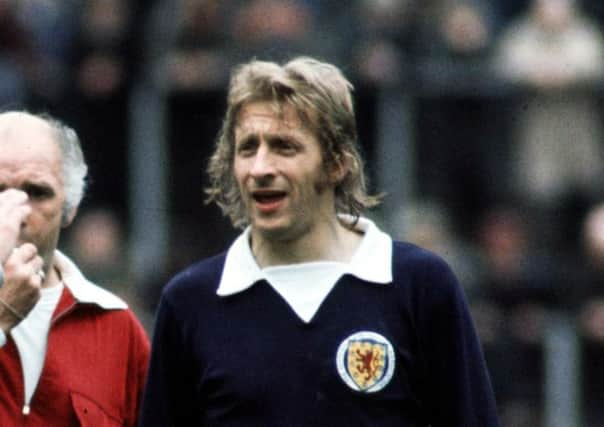Aidan Smith: Where is Denis Law’s knighthood?


What does Scotland’s greatest-ever footballer have to do to earn himself a knighthood? Aficionados of Kenny Dalglish will think I mean their idol and maybe if you loved Jim Baxter, Jimmy Johnstone or Billy Bremner the most you’d be arguing their case right now – although you’d have to concede that a pronounced rascally nature could be viewed as an impediment to such an honour, had any of that trio still been alive to take ownership of the title. No, I’m talking about Denis Law.
The King, The Lawman - or as we should call him now, Denis Law, CBE. Not Sir Denis, though, and that seems a shame, if you think such things matter, and maybe a small tragedy as well. I repeat: what does he have to do? Is being the most dashing, brave, ingenious, inspirational, heroic player to represent his country – and to perform with distinction in England and on the continent, becoming the first and probably last Scot to be anointed European Footballer of the Year – not enough?
Advertisement
Hide AdAdvertisement
Hide AdHe cannot do any more on the field of play, on the Field of Dreams, because he’s 75. He’s not prominent on TV, radio or in the newspapers, shouting his mouth off as a rent-a-gob pundit, which obviously makes it more difficult for civil servants in charge of the New Year Honours to notice him and, if they’re old enough, be reminded of his brilliance. But his modesty, surely, is another thing in his favour.
Who are football’s knights and what are their achievements? No one would quibble with the honour being given to Stanley Matthews, the imperishable England winger who won 54 caps when far fewer internationals were played and a famous FA Cup final pretty much by himself. He was knighted in 1965 while still playing – still the only footballer so decorated – before finally hanging up his boots at the age of 50.
There would be no dispute either about the knighthood awarded to Bobby Charlton, a World Cup-winner with England and a European Cup-winner with Manchester United - but Charlton would be the first to admit that his team-mate Law had been vital to Man U’s ascent to the summit of continental football, even though injury had cruelly prevented him from playing in the 1968 final.
So, too, would Man U’s manager, Law’s countryman Matt Busby, who became Scotland’s first footballing knight the year after the victory. But, as every Scottish schoolboy of a certain age will remind you, Man U were only the second British club to win the trophy, following Celtic 12 months before. Why no knighthood for their manager Jock Stein? That’s another story, deserving of another rant.
Charlton had to wait until 1994 for his honour. There were hardly any football knights and then suddenly there were quite a few, as Tony Blair’s New Labour, who’d already invited loutish pop bands to No 10, strove to cement their populist appeal. Another notable England wingman, Tom Finney, became a Sir in 1998, followed later than year by the hat-trick hero of 1966, Geoff Hurst. Alex Ferguson – the second and to date only other Scot – was knighted in 1999.
Now the debate – and feel free to share in it over a few drinks this Hogmanay – gets really interesting. What else did Hurst do for his knighthood apart from score three goals in a final played on home turf? Did he even score three goals? Did he pioneer the diving header? No, that was Denis. Did he prototype the overhead kick? Our man again.
Was Law’s contribution to the national sport any less than that of Trevor Brooking, another knight? And who is Dave Richards, or as we should call him these days, Sir Dave Richards? Not a goalscoring great but the chairman of England’s Premier League, who must have helped that division become so rich but, as his Wikipedia entry points out, has still managed the odd whinge about English footballing entitlement.
No one leads an entirely blameless life, and certainly not football people. Walter Winterbottom, knighted in 1978, was the first England manager, for a reign including two defeats – 0-1 to the USA and 3-6 to Hungary – which caused much soul-searching if not serious doubt about whether it was worth the team continuing to play football. But I’m trying to think of something Law did wrong, on or off the pitch, which could have diminished his legend and I can’t.
Advertisement
Hide AdAdvertisement
Hide AdKing Denis is a shy and retiring monarch who is rarely if ever glimpsed in the posh seats of a stadium, preferring an afternoon with the grandchildren instead. “He doesn’t really like football,” a veteran press-box scribe told me before my audience with him in 2012, and sure enough, he knew nothing of the hot issues of the moment and recalled how in his pomp he used to dread tactical briefings as they would disturb his pre-match routine of lying on a bench, shirt covering his eyes.
The legend was born through his exuberance, his goals and the manner in which he celebrated them – surprised grin, right arm aloft, shirt-sleeve clenched – and was not embellished, even though there was terrific opportunity for this. On the day of England’s World Cup victory, Law didn’t watch the final on TV. Ever since, his decision to play golf instead had been written up as the act of a great patriot – and over-written, he told me. Then he revealed he didn’t really want the Auld Enemy to lose – a last-minute win with a lucky goal would have been acceptable, and that’s more or less what transpired.
Similarly, you guess it won’t bother him that he’s not a knight and maybe that should be our attitude, too. Meanwhile, is it Sir David Beckham yet? Can’t be long now …